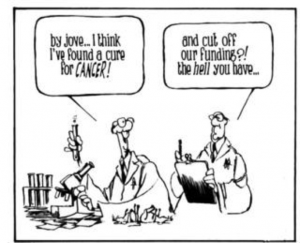Moonshot Hits A Wall
 I saw an article late last month before the ink was dry on the Executive Order and budget increase requests citing “the Vice President’s call for a cancer moonshot has struck a deep nerve in the research community as scientists blame the entrenched medical establishment for hoarding the data needed to make breakthroughs”.
I saw an article late last month before the ink was dry on the Executive Order and budget increase requests citing “the Vice President’s call for a cancer moonshot has struck a deep nerve in the research community as scientists blame the entrenched medical establishment for hoarding the data needed to make breakthroughs”.
Apparently, earlier in January, the Vice President said “vast troves of research were ‘trapped in silos, preventing faster progress and greater reach to patients.’”
The article went on to say, “Although many researchers did not dispute the claim, they are still reluctant to share the raw data used in their research, posing big obstacles to the vice president’s initiative. While the Vice President has promised to ‘break down silos and bring all the cancer fighters together’, he has not yet offered specifics about how to do that.
Anyone who has spent anytime in medicine surely would know all this already.
The cancer business is uber competitive. And it starts with basic science research of all kinds through to pharmaceutical drug development and delivery to market.
Medical institutions across the country have stood up enormous cancer centers designed to be clinical, research and administrative bastions of their healthcare organizations. Along with cardiology centers. And pediatric hospitals.
The reputations of a number of hospitals and universities are built upon their success, at least in part, to cancer research and treatment.
These developments are often times the result of the success within an institution rather than across institutions. Their revenue streams depend upon it.
In my own region, there are three very well-known cancer centers affiliated with major medical schools and teaching hospitals. Each has invested significantly in bricks and mortar and the finest researchers and best equipment they can to find cures and treatments and participate in sponsored clinical trials with payments per patient.
Add to that an increase in community hospitals opening academically-oriented cancer centers with similar goals in mind to those of the larger academic medical centers.
And most of this work goes on within institutions rather than across institutions. Anyone who has been to an AACR or ASCO meeting knows that cancer is big business. There are significant amounts of funding these institutions are competing for to make new discoveries and protect their intellectual property (IP).
The entire NIH funding process is designed to award funding to programs and institutions with the best infrastructure, people and resources to provide the most potential deliverables from the funding. This process is super competitive with only a few percent of all grants submitted awarded funding at any given time.
In order to remain competitive and protect their IP the many universities, hospitals and cancer centers do in fact protect their data. There are strong incentives to do so and not share that information. It goes hand in hand with my previous thoughts on “Interoperability Should But Will Not Happen”.
The reality is and our government officials need to understand as I mentioned previously in “Man on The Moon”, the war on cancer is not a single moon shot, the war has been and will be a series of battles as it has been all along with developments and incremental advances. Not with a scientific blitz, as dysfunctional as the process seems.
Even if that means those developments and incremental advances occur in data silos rather than an entire data farm.
Comments (3)
Mike Becich Mike Becich I really would like to solve this data siloization problem so we have a team of people in Pittsburgh trying to create a “Data Commons”…I would be happy to keep the community up to date on our progress.
Mike Becich, U Pitt Dept of Biomedical InformaticsRelevant Links today influencing our development include:
The NIH Commons – https://datascience.nih.gov/commons
The NCI Genomic Data Commons – http://www.cancer.gov/news-events/press-releases/2014/GenomicDataCommonsNewsNote and http://www.uchospitals.edu/pdf/uch_041893.pdf
The Pittsburgh Genome Resource Repository – http://pgrr.pitt.edu/Tom Boyd It is too bad Joe lost his son to cancer and it is too bad it took a personal tragedy to get him and Obama revved up against cancer. Unfortunately, the cancer business has grown into a massive global industry which generates too much money for too many people to just find a cure and everyone goes home. That will never happen. The genie is long out of the bottle.

































I really would like to solve this data siloization problem so we have a team of people in Pittsburgh trying to create a “Data Commons”…I would be happy to keep the community up to date on our progress.
Mike Becich, U Pitt Dept of Biomedical Informatics
Relevant Links today influencing our development include:
The NIH Commons – https://datascience.nih.gov/commons
The NCI Genomic Data Commons – http://www.cancer.gov/news-events/press-releases/2014/GenomicDataCommonsNewsNote and http://www.uchospitals.edu/pdf/uch_041893.pdf
The Pittsburgh Genome Research Resource – http://pgrr.pitt.edu/